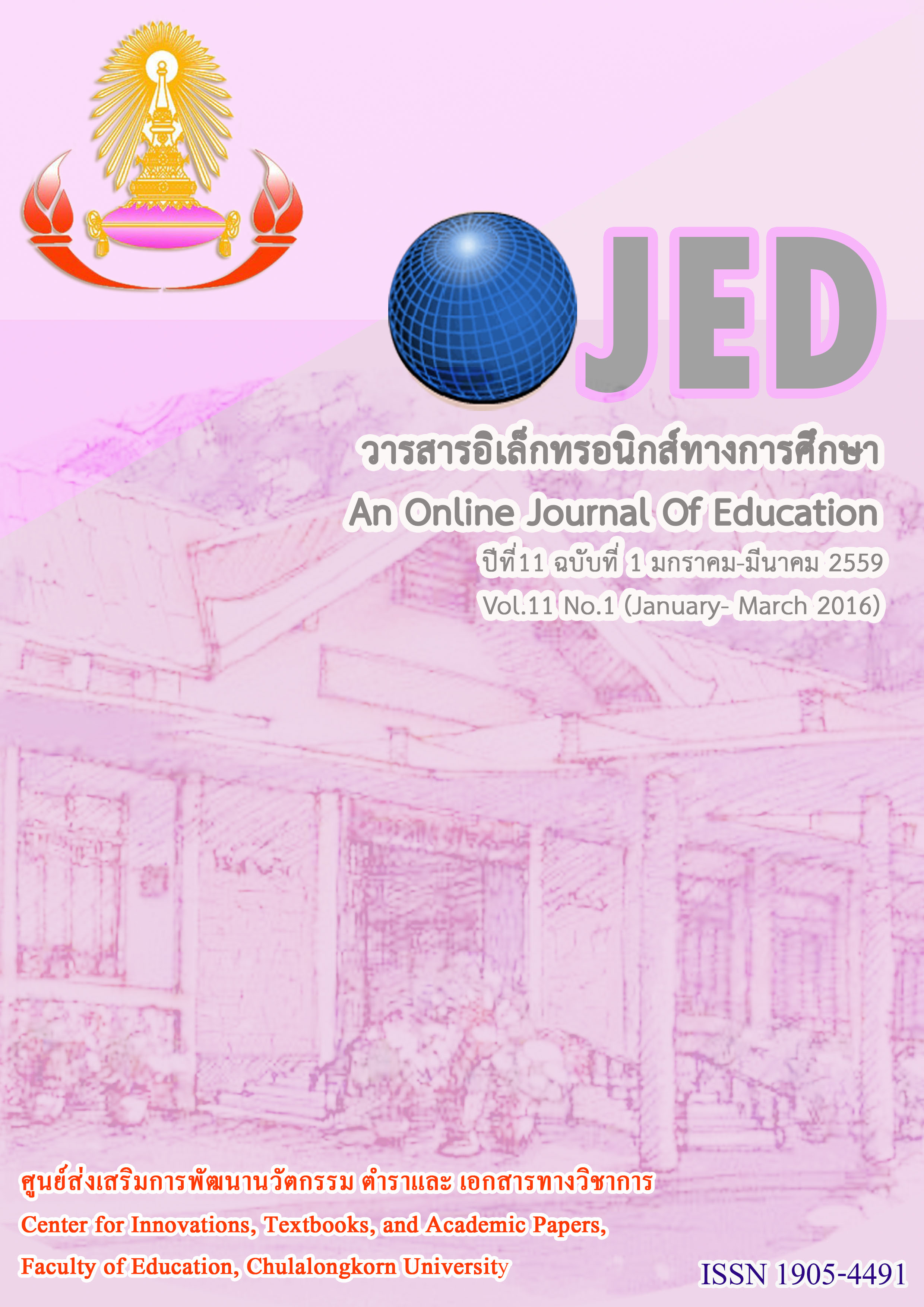ผลของการจัดกิจกรรมการเรียนรู้คณิตศาสตร์ตามแนวคิดการใช้ปัญหาเป็นหลัก และการเสริมต่อการเรียนรู้ที่มีต่อความสามารถในการเชื่อมโยง และการสื่อสารทางคณิตศาสตร์ของนักเรียนชั้นมัธยมศึกษาปีที่ 2 EFFECT OF AN ORGANIZING MATHEMATICS LEARNING ACTIVITY USING PROBLEM-B
Keywords:
แนวคิดการใช้ปัญหาเป็นหลัก, การเสริมต่อการเรียนรู้, ความสามารถในการเชื่อมโยงทางคณิตศาสตร์, ความสามารถในการสื่อสารทางคณิตศาสตร์, PROBLEM-BASED APPROACH, SCAFFOLDING, MATHEMATICAL CONNECTION ABILITY, MATHEMATICAL COMMUNICATION ABILITY.Abstract
การวิจัยในครั้งนี้มีวัตถุประสงค์คือ 1) เพื่อเปรียบเทียบความสามารถในการเชื่อมโยงและการสื่อสารทางคณิตศาสตร์ของนักเรียนที่ได้รับการจัดกิจกรรมการเรียนรู้ตามแนวคิดการใช้ปัญหาเป็นหลักและการเสริมต่อการเรียนรู้ระหว่างก่อนเรียนและหลังเรียน 2) เพื่อเปรียบเทียบความสามารถในการเชื่อมโยงและการสื่อสารทางคณิตศาสตร์ของนักเรียนที่ได้รับการจัดกิจกรรมการเรียนรู้ตามแนวคิดการใช้ปัญหาเป็นหลักและการเสริมต่อการเรียนรู้กับนักเรียนที่ได้รับการจัดการเรียนรู้แบบปกติ 3) เพื่อศึกษาพัฒนาการของความสามารถในการเชื่อมโยงและการสื่อสารทางคณิตศาสตร์ของนักเรียนที่ได้รับการจัดกิจกรรมการเรียนรู้ตามแนวคิดการใช้ปัญหาเป็นหลักและการเสริมต่อการเรียนรู้ กลุ่มตัวอย่างที่ใช้ในการวิจัยคือนักเรียนชั้นมัธยมศึกษาปีที่ 2 จำนวน 99 คน เครื่องมือที่ใช้ในการวิจัย คือ แผนการจัดกิจกรรมการเรียนรู้คณิตศาสตร์ตามแนวคิดการใช้ปัญหาเป็นหลักและการเสริมต่อการเรียนรู้ แบบวัดความสามารถในการเชื่อมโยงและแบบวัดความสามารถในการสื่อสารทางคณิตศาสตร์ การวิเคราะห์ข้อมูล โดยหาค่าเฉลี่ยเลขคณิต ส่วนเบี่ยงเบนมาตรฐาน การทดสอบค่าที และ ANCOVA
ผลการวิจัยพบว่า 1) นักเรียนกลุ่มทดลองมีความสามารถในการเชื่อมโยงและการสื่อสารทางคณิตศาสตร์หลังเรียนสูงกว่าก่อนเรียน อย่างมีนัยสำคัญทางสถิติที่ระดับ .05 2) นักเรียนกลุ่มทดลองมีความสามารถในการเชื่อมโยงทางคณิตศาสตร์สูงกว่ากลุ่มควบคุม อย่างมีนัยสำคัญทางสถิติที่ระดับ .05 แต่ นักเรียนกลุ่มทดลองมีความสามารถในการสื่อสารทางคณิตศาสตร์ไม่สูงกว่ากลุ่มควบคุม อย่างมีนัยสำคัญทางสถิติที่ระดับ .05 3) นักเรียนที่ได้รับการจัดกิจกรรมการเรียนรู้ตามแนวคิดการใช้ปัญหาเป็นหลักและการเสริมต่อการเรียนรู้ มีพัฒนาการความสามารถในการเชื่อมโยงและการสื่อสาร ทางคณิตศาสตร์ในทางที่ดีขึ้น
The purposes of this research were to: 1) compare the mathematical connection and communication ability of students between, before, and after being taught by a problem-based approach and scaffolding; 2) to compare the mathematical connection and communication ability of students between groups being taught by a problem-based approach and scaffolding; and 3) to develop the mathematical connection and communication ability of students being taught by a problem-based approach and scaffolding. The sample included 99 eighth year students at Suksanari School in the second semester of the 2015 academic year. The instruments for data collection were mathematical learning plan, pre-test and post-test for connection and communication ability. The data were analyzed by using arithmetic mean, standard deviation, F-test and ANCOVA.
The results of the study revealed that: 1)the mathematical connection and communication ability of students after being taught by organizing mathematics learning activities using the treatment was higher than those before instruction at a 0.05 level of significance; 2) the mathematical connection ability of students after being taught by organizing mathematics learning activities using the treatment was higher than those of students being taught by a conventional approach, but the mathematical communication ability was not higher at a 0.05 level of significance; and 3) the mathematical connection ability of students after being taught by organizing mathematics learning activities using the treatment.




